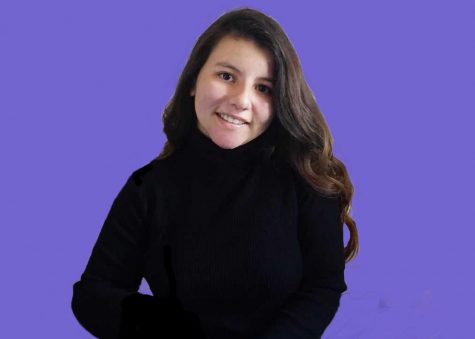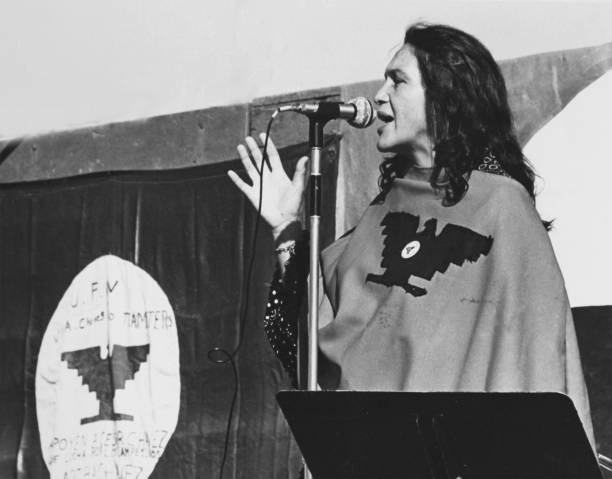Latinas Who Made a Difference: Dolores Huerta
A fierce advocate for farmworkers’ rights in the 1960s, Huerta’s legacy of “Si, se puede” lives on.
American labor activist and co-founder of the United Farm Workers of America (UFW) Dolores Huerta speaks on stage during a UFW rally, California, 1975 or 1976. She wears a poncho with the UFW logo. (Photo by Cathy Murphy/Getty Images)
Her voice is small, but her “Sí, se puede” was heard around the nation; her relentlessness and courage changed the lives of thousands. Yet, her story is often overshadowed by the work of her partner—Cesar Chavez.
Dolores Huerta, 91, has spent most of her life protesting for farmworkers’ rights. She has been beat up, chased down and almost shot at, but Huerta fearlessly kept fighting because she saw a need.
She coined the famous phrase “Sí, se puede,” which in Spanish means “Yes, you can,” in 1972 during Cesar Chavez’s hunger strike. The phrase would go on to inspire people like President Barack Obama, who used the phrase, “Yes, we can” as his campaign slogan.
After getting her teaching degree at Stockton College, Huerta became an elementary teacher, but she didn’t last long. Huerta was forced to resign because it broke her heart to see how little means the children of farmworkers had.
In an interview with NPR, National Public Radio, Huerta said, “The families were so poor. I think that’s one of the things that really infuriated me. When I saw people in their homes, they had dirt floors. And their furniture were orange crates and cardboard boxes. People were so incredibly poor and they were working so hard.”
The workers barely had enough money to feed their children.
“The children were [suffering from malnutrition] and very ill-clothed and ill-fed. I said, ‘This is wrong,’ because you saw how hard they were working, and yet they were not getting paid,” Huerta said.
At 25, she joined the Community Service Organization’s Stockton branch. This is where she met the man that gave her a voice, Fred Ross Sr. Ross; the organizer of the Stockton branch.
One day a paralized farmworker came into the office needing help to file an application for welfare. Huerta agreed but once they went down to the welfare office they said Huerta couldn’t help him.
“I went back to the office and told Mr. Ross, ‘They won’t let me make an application.’ He said, very sternly, ‘You go right back down to that welfare office and you demand to see a supervisor, and you demand they let him make an application,’” Huerta said during her 2019 Ted Talk.
Huerta went back down and got the worker his disability.
“That taught me a lesson, that taught me that I had a voice,” Huerta said. “[Mr. Ross] taught us not only can we make demands of people, but especially of our public officials, this is something we should all keep in mind.”
During her time at CSO, she created the Agricultural Workers Association. The AWA helped with voter registration and used local governments to make improvements in low-income areas.
By 1962, Huerta and her colleague, Cesar Chavez, left the CSO and created their own group, the National Farm Workers Association, to organize farm workers.
In 1965, the NFWA—which later changed to the United Farm Worker—organized 5,000 grape farmers over the span of 30 miles to strike for better conditions.
In her interview with NPR, she explained just how terrible the conditions in the fields were.
“The farmworkers were only earning about 70 cents an hour at that time—90 cents was the highest wage they were earning. They didn’t have toilets in the fields; they didn’t have cold drinking water. They didn’t have rest periods. People worked from sunup to sundown. It was really atrocious,” Huerta said.
The strike to improve these conditions wasn’t free of complications; Huerta and other strikers faced a lot of violence.
“We had violence directed at us by the growers themselves: trying to run us down by cars, pointing rifles at us, spraying the people when they were on the picket line with sulfur. They came at us with two by fours. We had a lot of violence, definitely,” Huerta said.
Huerta’s role was important because she negotiated the farmworkers’ contracts after the strike. Huerta was a key contributor of organizing over 17 million people to boycott grapes nationwide. The boycott led to the California Agricultural Labor Relations act of 1975 which gave farm workers the ability to form unions and have better conditions.
Huerta caught the notice of presidential candidate, Robert F. Kennedy, after he visited Delano, California to take part of the Senate Labor Subcommittee. In 1968, Kennedy invited Huerta to attend his party at the Ambassador Hotel in Los Angeles after winning the Democratic Party presidential primary.
Huerta stood right next to Kennedy on the podium during his primary victory speech as he gave thanks to the laborers and those working on the farmworkers movement. Just a few minutes later, Kennedy would be assassinated.
Kennedy was one of the movement’s biggest allies; his death really affected Huerta, but her activism continued on.
“We had no choice to go on. At that point we were working on the great boycott for three years already. The workers were depending on us to continue forward. We had no choice, we had to go forward. That’s what Kennedy would have wanted us to do,” Huerta said in an interview with New Mexico In Focus.
Even though Huerta supported Kennedy, her lack of support for President George H.W. Bush almost led to her death. In 1988 Huerta attended a peaceful protest in San Francisco against Bush’s policies. At the protest Huerta was beaten by police. The beating caused Huerta to break many ribs and resulted in the removal of her spleen. She almost died from this incident.
Mistreatment never deterred from fighting for farm workers rights. Relentless fighting is what earned Huerta a Presidential Medal of Freedom in 2012—the highest honor a civilian can receive.
At 91, Huerta still fights and protests for justice. She encourages others to use their voice and stand up for what they think is right with the spirit of “Sí, se puede.”
Huerta said, “We must use our lives to make the world a better place to live, not just to acquire things. That’s what we are put on the Earth for.”



